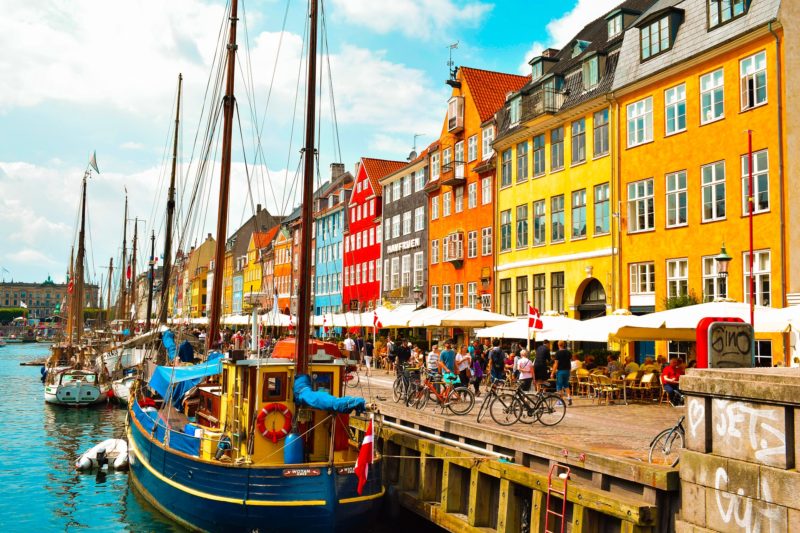Studies in Denmark - fields of study, opinions, requirements, costs
- Home
- >
- Study in Denmark
Spis treści
Studies abroad in Denmark are the 4th most popular direction to study abroad, just after the UK, Germany and the Netherlands. Annually, about 1.5 thousand Polish students study at universities in Denmark.
What attracts Poles to this country and what requirements and costs must be taken into account when studying in Denmark?
What is studying in Denmark like?
For many years, Denmark has been constantly in the top 3 happiest countries in the world.
What makes it rank so high?
Students emphasize that they appreciate in Denmark the following:
- Work-life balance – in Denmark, the working week is a maximum of 37 hours and you can take up to 5 weeks of vacation a year
- High earnings – Denmark has one of the highest GDP in the world, which is reflected in high salaries
- Care for ecology – Denmark is one of the countries with the cleanest air in Europe
- Free studies – higher education in Denmark is free for all European students
In Denmark you can study at 5 types of universities:
- Universities
- University Colleges
- Business Academies
- Artistic Higher Institutions
- Schools of Maritime Education
Most courses in English are offered by University Colleges and Business Academies, where bachelor’s studies last between 3 and 4 years and combine university education and a mandatory professional internship in their study program. As in the Netherlands, many students looking for practical experience choose to study in Denmark.
You can read more about the universities in the page Study in Denmark – Universities.

Study in Denmark - Fields of study
Depending on their type, universities offer different courses.
Universities focus on theoretical courses, University Colleges on theory combined with practice, while Business Academies focus on business-related courses.
| Type of university | What majors are offered? | University example | Duration of bachelor’s studies |
|---|---|---|---|
| Universities | Economics, Mathematics, Anthropology, Chemistry, Cognitive Science | Aalborg University, Aarhus University, University of Copenhagen, Roskilde University, University of Southern Denmark | 3 years |
| University Colleges | Architectural Technology, Engineering, Computer Science, Marketing Management, Multimedia Design, Design and Technology, Software Engineering, Logistics | VIA University College, UCL University College, University College of Northern Denmark | 2,5 - 3,5 years |
| Business Academies | Multimedia Design, Tourism Management, International Business, Computer Science, Business and Sociology, Marketing Management, Language and Culture | Business Academy Aarhus, Copenhagen Business School, Zealand Academy, | 2 - 3 years |
| Artistic Higher Institutions | Composition, Crafts, Dance and Choreography, Jazz, Sound Engineer, Classical Music, Architectural Technology | Danish National Academy of Music, The Danish National School of Performing Arts, The Royal Danish Academy of Music | 3 years |
| Schools of Maritime Education | Energy - Technology and Management, Vessel Manager | Copenhagen School of Marine Engineering and Technology Management, Aarhus School of Marine and Technical Engineering | up to 1 year |
Schools of Maritime Education are more like supplementary schools that are paid and usually offer vocational courses.
At other universities in Denmark, there are two types of study programs at the first cycle – AP degree and Bachelor degree.
A bachelor degree is equivalent to a standard bachelor’s degree, which gives incomplete higher education and after which you can continue your studies at the master’s level. The Bachelor lasts 3 years and is offered at Universities, University Colleges and Artistic Higher Institutions.
An AP degree is not equivalent to a bachelor’s degree. It’s a type of apprenticeship program that gives you hands-on experience, but no college education. The AP degree usually lasts 2-2.5 years and is offered at University Colleges and Business Academies.
If you want to get a full education at the bachelor’s level, after the AP degree it is necessary to do a Top-Up major. Such a course usually lasts 1.5 years and can often be studied at the same university as an AP degree. Note! There is no guarantee that you will get into this major, there are usually far fewer offers than AP degrees.
Here, a good alternative is Top-Up made in another country – e.g. in the UK or Germany.
AP degree + Top-Up is equivalent to a Bachelor degree, then you can apply for a master’s degree or define your education as higher.
Studies in Denmark in English are possible with an AP degree, Bachelor degree and Top-Up.
However, Denmark offers a limited range of undergraduate courses in English.
From 2022, further restrictions have been introduced regarding English-language courses – mainly Business Academies courses are closed or limited.
What are the most popular English-language study programs in Denmark?
- Computer Science
- Business studies (Marketing, Economics, Logistics)
- Architectural Technology
- Engineering
Foreign students most often choose IT, business, economics or technical studies – there are also the largest number of such courses in English in Denmark.
Artistic Higher Institutions, on the other hand, offer art studies in English – here the popular fields are studies related to music composing or choreography – all correlated with classical music.
In Denmark you can also find courses such as Multimedia Design, Animation and Graphics.
What majors aren’t available in English at the Danish universities?
In Denmark, it is not possible to study psychology or health-related courses at undergraduate level. The same applies to language studies. Such majors are available in Denmark, but only in Danish.

Medical studies in Denmark
Given the limited number of courses in English in Denmark, it is not possible to study medicine in English at the bachelor’s level.
For the master’s studies, you can apply for medical-related studies – Medical Chemistry, Physics, Molecular Biology, Public Health. Medicine in Danish can be studied at Aalborg University, Aarhus University, University of Copenhagen and University of the Southern Denmark.
Architectural studies in Denmark
Bachelor’s Degree in Architecture Studies in English can be completed at Architectural Technology and Construction Management courses.
Yet, this field of study does not prepare you strictly for the work of an architect. Architecture technology is aimed at professional preparation for work on the construction site.
You can study architecture in Denmark only in Danish.
Only master’s studies give the opportunity to apply for architectural studies in English – then the studies last 2 years.
Universities that offer architecture in English for Masters in Denmark are:
Masters in Denmark
Ze względu na ograniczoną liczbę kierunków po angielsku na studiach licencjackich, coraz więcej studentów decyduje się bezpośrednio na studia magisterskie w Danii, których zakres jest znacznie szerszy niż na studiach I stopnia.
Master’s studies in Denmark are also free and last from 1 to 2 years.
In the case of master’s studies, there are strict application deadlines – the application lasts from January 1 to March 1.
In addition to typical master’s degrees, you can also find short-term programs in Denmark. Short term programs function as postgraduate studies – they last for one term or one year and are a supplement or extension of professional knowledge.
Note! Short term programs are also full-time studies, and unlike standard education in Denmark, they are paid.

Study in Denmark - Requirements
Have you already chosen a major, but you don’t know what requirements you need to meet?
The most important criteria when applying to Denmark are:
- list of hours in each subject (how many hours were completed in a given subject throughout the high school)
- language test (IELTS, CAE, TOEFL)
When applying for studies in Denmark, final school exam results and grades from the last year of high school are also important – universities primarily look at subjects that are key to a given field of study, i.e. when applying for engineering, they will pay attention to grades in physics, mathematics and the overall grade point average .
The key document for recruitment to study in English in Denmark is a language certificate. The most popular certificates that can be passed are: IELTS, TOEFL, CAE.
When and how to apply to study in Denmark?
Recruitment takes place on strictly defined dates – between February 1 and March 15.
In order to be admitted to study in Denmark, it is necessary to apply online through the Optagelse portal, where you enter basic information about yourself, choose universities and courses, and add the necessary documents to the application. You can choose up to 8 majors and you can attach different documents for each of them.

What it comes from?
Some universities, apart from the basic requirements, such as a language certificate or a list of course hours, ask applicants to attach additional documents such as a cover letter, CV, references or certificates from volunteering or additional courses.
In March, some universities, after sending the application, are still conducting recruitment interviews, which are an additional element of the selection of applicants.
If you have not yet graduated from high school at the time of your application, you can of course attach your high school exam results and high school grades to the system after receiving them – the most important thing is to do it at the beginning of July at the latest, so that the university has enough time to consider the application, up to end of August when studies in Denmark start.
If you want to know more about the application to study in Denmark, go to the HOW TO GET page.
Study in Denmark - Costs
The next step that is worth considering is finances to spend on studies.
Studying in Denmark is free – so there are no costs in terms of tuition fees.
The application for studies is also free, so the only thing you need to consider is the cost of textbooks and the cost of living.
Denmark is quite an expensive place to live. The finances you need to spend on living are also often related to the city where you study and the type of accommodation you choose. On average, the monthly expenses come to around 1,100 euros per month.
How can I finance my living expenses while studying in Denmark?
Part-time work is certainly a good solution and most students take advantage of this option. Without knowing Danish, you can work in the catering industry, as couriers or as university ambassadors.
One of the solutions for occasional work during studies is also joining EduCat as a mentor and helping future students in preparing for studies at your university.
Although studies in Denmark are free (for students from the European Union), the Danish government offers a subsidy called SU grant for every part-time student. For 2021, the SU grant was 849 euros per month.
This grant is awarded automatically to all students (including international students) who combine work and study.
You can read more about the cost of living and the SU grant in the COSTS page.

Study in Denmark - Reviews
Is it worth studying in Denmark?
Students appreciate mainly the following aspects:
- Free studies
- High income
- Co-financing of maintenance costs
Most students try to find a job while studying in Denmark.
Combining studies and work is not a problem – students spend an average of 20 hours on classes at the university.
What students also emphasize is that finding a job in Denmark takes a few months – it’s worth taking care of it before your studies start.
Admitting into university depends largely on the field of study and the university – for example, a large number of students try to get into Copenhagen Business School every year, so the competition is high. However, there are fields of study that conduct supplementary recruitment after March 15 (usually until July 5, 12:00).
If you want to maximize your chances of getting into the university of your choice or need someone to guide you through the formal path, take advantage of the mentoring hours on the EduCat Platform and apply with the help of a Danish university student!
Application to study abroad with EduCat
Have you read the article and want to apply to study abroad?
Do you have any questions about the application?
EduCat will help you with the application process to study abroad. Our Mentors support students at various stages of preparing for the application – whether you need help with the application system, issues before going to university or the entire process from start to finish. You can use all the support in one place – on the EduCat platform.
In the meantime, write to us and we will try to answer all your questions and help you prepare for your studies abroad.

